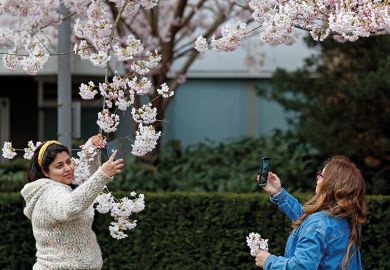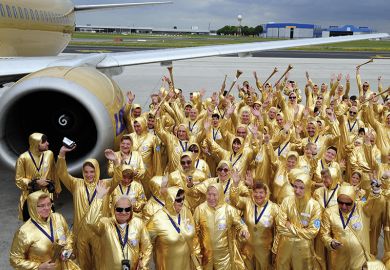Academics could participate in military-style war games to prepare for future emergencies such as catastrophic pollution, extreme heat or financial meltdowns, under plans being considered by the European Commission.
Screenwriters could even be drafted in to come up with disaster scenarios, and scientists given a matter of months to scramble and devise a solution, following a review of how research and innovation across the continent has responded to the Covid-19 pandemic.
The commission told Times Higher Education that it was considering the proposal, put forward by Peter Varnai, a partner at the Technopolis Group, in a report that it had requested. Such exercises could begin during the second round of projects funded by Horizon Europe, the bloc’s €95.5 billion (£82 billion), seven-year research framework.
“The idea is that you can simulate that environment of extreme disaster or event – it can be health, environmental, financial, it can be an extraterrestrial if you want to push it to the extreme,” explained Dr Varnai.
The pandemic was a “fire-drill forced upon us”, according to the recently released future-gazing report, The Scientific, Technological and Societal Conditions of the End of the Covid-19 Crisis.
“The R&I system can be regarded as a sort of ‘immune system’ that will ‘remember’ this pandemic if that memory is kept alive with regular fire drills/military-type exercises – through perhaps new types of research challenges – where speed and self-organisation are important aspects of scientific quality,” the report says.
“We have national risk registers. We anticipate disasters,” Dr Varnai explained. But in research, “the whole idea is that researchers tend to think in the very long term”.
The pandemic, on the other hand, had forced the research system – after an “initial shock” – to “self-assemble” and “find a way” to respond very rapidly.
“The real question is: do we really want that kind of timeout, because we had months when the wider research system was in shock. Can we do it better? Can we learn from it?” he asked.
Exactly how the research and innovation system could war-game future disasters is not spelled out in the report, and Dr Varnai stressed that it was a “creative idea” that appeared to be unprecedented in academic research.
But one possibility would be to organise regular competitions with prizes backed up with tens of millions of euros of funding, for transdisciplinary research teams to come up with ideas to combat simulated problems.
“It has to have a scale and a visibility that captures the imagination,” Dr Varnai said. “It definitely has to be a €50 million-plus endeavour.”
Prizes and challenges are already used as a way of stimulating rapid invention by scientists, most famously by the US’ Defense Advanced Research Projects Agency, and are also deployed by the EU. But these are not generally aimed at coming up with solutions to catastrophes, Dr Varnai pointed out.
Examples of hypothetical disasters included oceanic ecosystem collapse caused by pollution; unliveable temperature spikes; “flash crashes” in the financial markets; or global GPS outages, he said.
“If you bring in a couple of film screenplay writers, they can help with creative ideas,” Dr Varnai said.
“Normally, time is not of the essence for academic researchers,” he continued. However, “in a fire drill, in a real one, you measure how quickly people leave a building”. Proposals could be judged on the timeliness of their outcome, not just scientific quality, he said.
Still, one issue for scientific war games would be getting politicians and industry involved as well, he acknowledged, with the Covid-19 pandemic demonstrating how policy responses were shaped by political and economic imperatives as much as by scientific evidence.
“It’s a hard question. It’s hard to tell the average shareholder that a company might engage in something that’s of long-term societal interest, rather than short-term commercial gain. But in a post-pandemic world, I think they would have more interesting and capacity to participate if it’s pitched at the right level,” he said.
For now, Dr Varnai’s idea is just that – an idea. But the commission is nonetheless taking an early-stage interest.
“With the emphasis the commission puts on foresight and preparedness, we are looking at all ways to strengthen the contribution of R&I to preparedness and resilience, and this includes the recommendations of the study, The Scientific, Technological and Societal Conditions of the end of the Covid-19 crisis,” a spokesman said.
“While we do not have explicit provisions for such projects in the first work programmes of Horizon Europe (2021-22), as we draw lessons from the pandemic for the second batch of Horizon Europe work programmes (2023-24) with a view to strengthening preparedness, we may consider whether to experiment with such innovative ideas.”
POSTSCRIPT:
Print headline: Europe mulls ‘war games’ to brace for future crises
Register to continue
Why register?
- Registration is free and only takes a moment
- Once registered, you can read 3 articles a month
- Sign up for our newsletter
Subscribe
Or subscribe for unlimited access to:
- Unlimited access to news, views, insights & reviews
- Digital editions
- Digital access to THE’s university and college rankings analysis
Already registered or a current subscriber?







